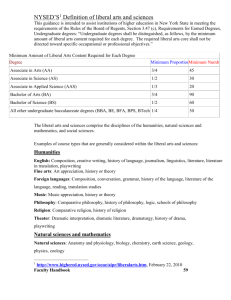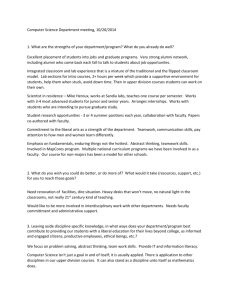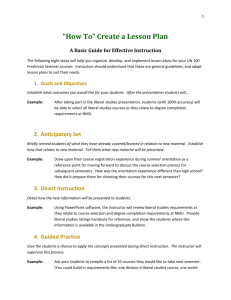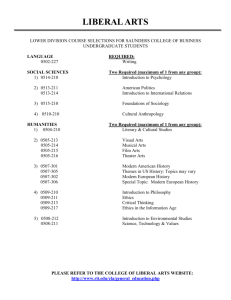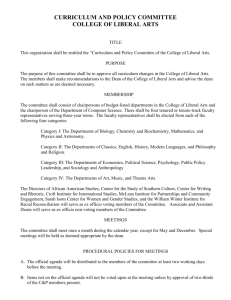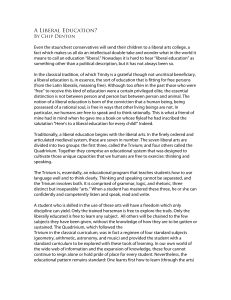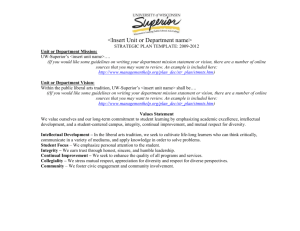“I Am a Person, Not a Number: A Reflection on My Liberal Arts
advertisement
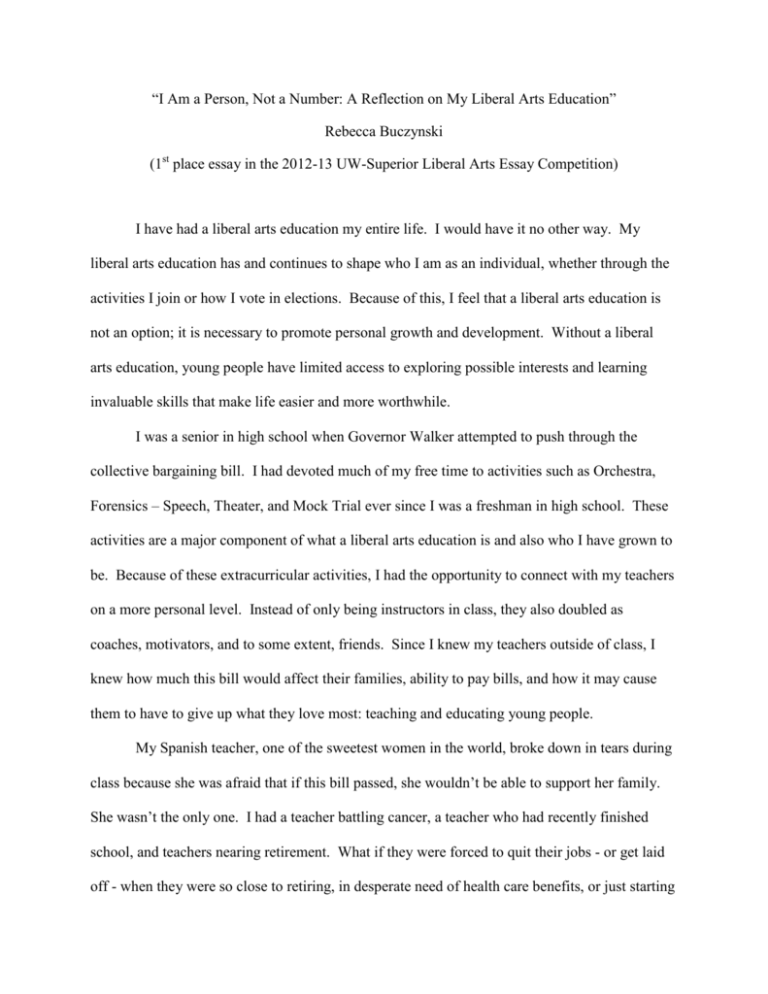
“I Am a Person, Not a Number: A Reflection on My Liberal Arts Education” Rebecca Buczynski (1st place essay in the 2012-13 UW-Superior Liberal Arts Essay Competition) I have had a liberal arts education my entire life. I would have it no other way. My liberal arts education has and continues to shape who I am as an individual, whether through the activities I join or how I vote in elections. Because of this, I feel that a liberal arts education is not an option; it is necessary to promote personal growth and development. Without a liberal arts education, young people have limited access to exploring possible interests and learning invaluable skills that make life easier and more worthwhile. I was a senior in high school when Governor Walker attempted to push through the collective bargaining bill. I had devoted much of my free time to activities such as Orchestra, Forensics – Speech, Theater, and Mock Trial ever since I was a freshman in high school. These activities are a major component of what a liberal arts education is and also who I have grown to be. Because of these extracurricular activities, I had the opportunity to connect with my teachers on a more personal level. Instead of only being instructors in class, they also doubled as coaches, motivators, and to some extent, friends. Since I knew my teachers outside of class, I knew how much this bill would affect their families, ability to pay bills, and how it may cause them to have to give up what they love most: teaching and educating young people. My Spanish teacher, one of the sweetest women in the world, broke down in tears during class because she was afraid that if this bill passed, she wouldn’t be able to support her family. She wasn’t the only one. I had a teacher battling cancer, a teacher who had recently finished school, and teachers nearing retirement. What if they were forced to quit their jobs - or get laid off - when they were so close to retiring, in desperate need of health care benefits, or just starting their first major job? I felt this to be such an injustice to these wonderful people, who spend extra unpaid hours every day doing things for their students, so I did everything in my power as a student to oppose the bill. I planned a school walk-out, attended rallies, and went to the protests down in Madison. Soon after, I realized that this bill could also drastically affect UW-Superior with severe budget cuts and tuition hikes. No school in Wisconsin was safe. Last year, I proudly voted to recall Governor Walker in support of my teachers, friends, and future generations. In college, I have been able to continue participating in politics. During the presidential election season, I had discussions with friends and coworkers about the two candidates. For example, one of my coworkers and I – we each supported different candidates – had a dialogue about why we had voted a particular way. No voices were raised, no one felt hurt or disrespected. We just sat and shared our opinions. I am so thankful that I have learned to listen to other people and voice my thoughts in a respectful way. This is an invaluable life skill that a liberal arts education has given me. In my mind, this is exactly what education should be all about: learning to listen to and respect others for who they are while exploring the world around us. I thought that education in America was concrete, that a liberal arts education was the standard of education in America. But because of the protests, the recall, and watching the presidential debates, I have realized that a liberal arts education is something that we have to fight for in America. When politicians make cuts to education budgets, things such as art, music, and extracurricular activities are the first to see funding disappear. Slowly, we are becoming a nation just like many others. In China, for example, students study only the core subjects in school. My current college roommate is from China, and we often talk about cultural differences. One of the things she finds “cool” about me is that I have been involved in orchestra for a major portion of my life. In China, these activities are obsolete in education except at expensive private schools only for music. My roommate told me that she would start school every day – and I mean every day, even the weekends – at 7 am and go until 9 pm. She spent these entire fourteen hours of school a day devoted to learning math, science, English, physics, and other core subjects that show up on standardized testing. Once the school day ended, she went home to do her homework. In China, being a student is more than a full-time job. It is a way of life. Another difference that my roommate noted is in how students are accepted into college in America versus China. In America, aspiring students focus on personal essays. This gives the College Board an idea of who individuals are as people and whether or not the applicants are students the college wants on its campus. In China, however, students are accepted into college solely based on their college entrance examination score. Students are reduced to being a number in the system. Numbers make everything easier, but they take away so much of who a person is and what he or she has to offer not only the campus, but the rest of society and the world. While I was growing up, I was pushed by my parents to become as independent as possible as soon as possible. My liberal arts education supported this; I was able to learn domestic skills in home economics, computer and typing skills, as well as how to prepare for interviews. To me, this knowledge is far more important than anything I will be tested on during a standardized test; it is knowledge that keeps me alive in a dog-eat-dog world. My roommate, however, had few of these skills when she came to America because of the non-liberal arts education she had received. During her first semester at UW-Superior, she went through an incredible transformation from being a reserved braggart to experimenting in the kitchen, working multiple jobs, and becoming quite gregarious. It was incredible to see how a change in environment can influence someone’s personality and behavior. This is what makes us different from some other countries. In America, young people are encouraged to learn music, to paint, to draw, and to write poetry. For the most part, it is culturally acceptable to go to school and give it your best shot, because that is really all you can give. We focus on developing people, not perfect test scores. We explore our desires and try new things. We are a nation of people who know the world and what lies in it once we leave the school doors. We are a nation of people whose young adults can take care of themselves. We are a nation of independent, well-rounded, creative people. We are a nation of people, not a nation of numbers, and I hope that it always stays that way. This is a creed I believe in, and I will do whatever it takes to fight for it.


